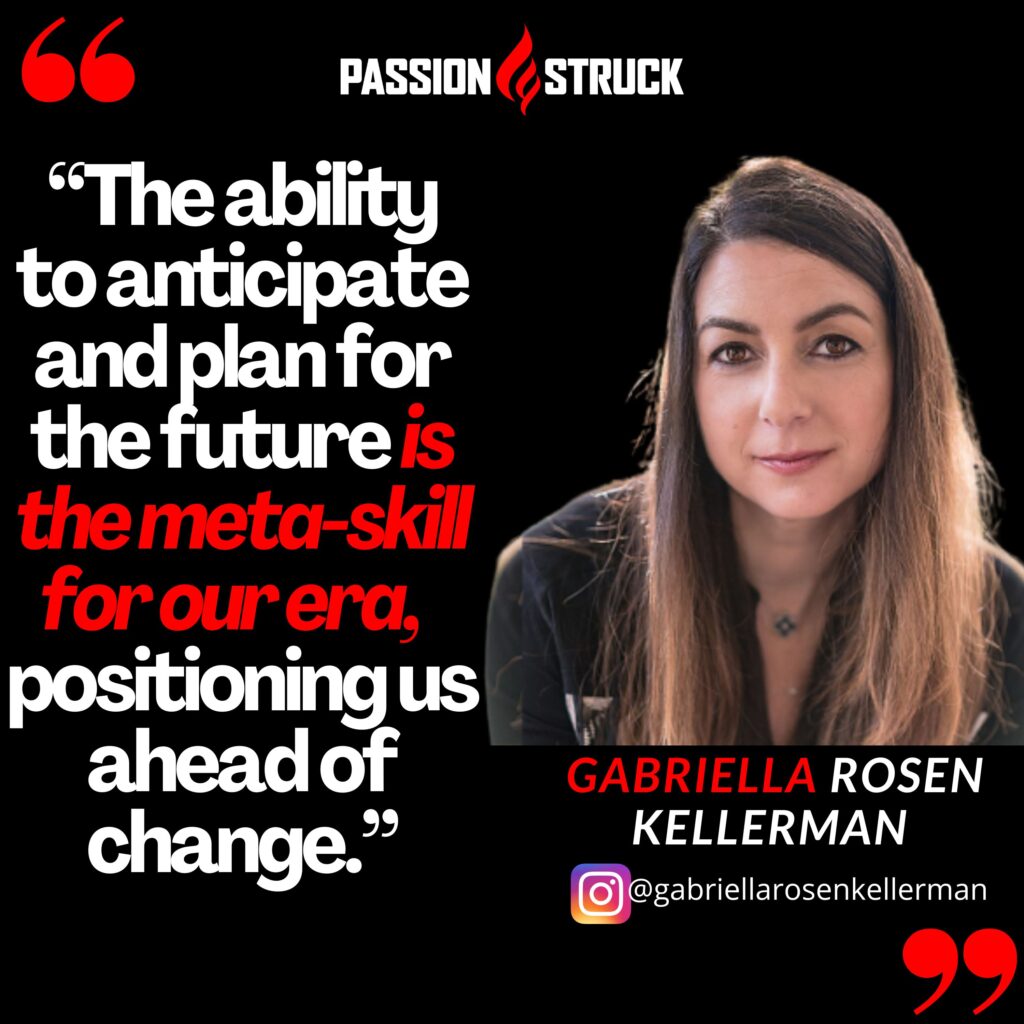Do you feel like you’re struggling to keep up with the fast-paced changes happening in your workplace? I will offer you a solution to help you not just cope but thrive during uncertain times — by cultivating creativity and innovation. Read on to learn more.
Our expert guide, Gabriella Rosen Kellerman, MD, has experienced these challenges firsthand, transitioning from psychiatry into the Chief Innovation Officer role at BetterUp. With her unique perspectives and experiences, she’ll show us the key building blocks of resilience, ways to unlock our creative potential, and how to adapt smoothly to whatever the future may hold in our professional lives. Gabriella is the co-author, with Martin Seligman, of the new book Tomorrowmind: Thriving at Work with Resilience, Creativity, and Connection―Now and in an Uncertain Future.
“The ability to anticipate and plan for the future is the meta-skill for our era, positioning us ahead of change
Gabriella Rosen Kellerman
In today’s fast-paced, ever-evolving world, cultivating creativity and innovation is not just a luxury but a necessity for professionals striving to stay ahead of the curve. The rapid changes in technology and work environments greatly impact our personal and professional lives, making it essential to develop a resilient mindset, embrace adaptability, and foster meaningful connections. This blog will guide you through key steps to navigate the constantly changing landscape with ease and success, highlighting the importance of emotional regulation, cognitive agility, and continuous learning.
Five Steps to cultivate creativity, adaptability, and Resilience
As professionals navigating the complexities of modern work environments, it’s essential to recognize that cultivating creativity and innovation is key to staying relevant and thriving amid constant change. Empowering yourself with the right mindset, skills, and support system can make a world of difference in how you confront new challenges and uncertainties, both personally and professionally. I’ll dive into the following crucial steps you can take to become more adaptable, resilient, and genuinely excited about the endless possibilities that our constantly changing world presents.
Let’s learn how to:
- Embrace adaptability and cultivate a growth mindset.
- Develop emotional regulation and self-compassion.
- Enhance cognitive agility and optimistic thinking.
- Build self-efficacy and foster resilience.
- Encourage meaningful connections and social support.
Embrace adaptability and cultivate a growth mindset.
In addition to fostering personal growth and development, embracing adaptability and cultivating a growth mindset can have far-reaching benefits in the workplace as well. Teams that encourage adaptability and a growth mindset among its members can foster a culture of continuous learning and innovation, leading to greater productivity and success. This environment nurtures a sense of collaboration and camaraderie, where employees feel empowered to take risks, learn from their mistakes, and develop new skills that lead to personal and professional growth. As a result, organizations that promote adaptability and a growth mindset are better equipped to navigate the dynamic and competitive landscape of today’s business world, ensuring long-term success and sustainability.
As the workforce becomes increasingly diverse and interconnected, embracing adaptability and a growth mindset is essential for fostering inclusive and equitable work environments. Possessing an adaptable mindset allows professionals to better understand and appreciate the diverse perspectives, values, and experiences of their colleagues, fostering empathy and collaboration across cultural and generational divides.
Additionally, a growth mindset encourages individuals to confront and challenge their own biases and assumptions, fostering self-awareness and supporting the development of more inclusive workplace policies and practices. In this way, cultivating adaptability and a growth mindset contributes not only to personal and professional growth but also to the cultivation of thriving, inclusive work environments that drive collective success. In summary, embracing adaptability and cultivating a growth mindset are essential components for navigating the complexities and challenges of today’s professional landscape.
By fostering resilience, creativity, and adaptability, individuals can not only achieve personal and career success but also contribute to the development of innovative, inclusive, and successful teams and organizations. As the professional world continues to evolve and transform, cultivating a growth mindset and adaptability skills will be vital in ensuring that individuals and organizations can successfully navigate change and thrive in the face of uncertainty.
Develop emotional regulation and self-compassion.
In order to develop emotional regulation and self-compassion, professionals should incorporate regular practices and mindfulness exercises into their daily routines. Techniques such as deep breathing, meditation, and journaling can help individuals gain greater control over their emotions and thought patterns. Furthermore, learning to reframe negative thoughts, cultivate gratitude, and seek support from colleagues, friends, or mental health professionals can foster emotional resilience and self-compassion in the face of adversity.

By consistently engaging in these practices, professionals can strengthen their ability to deal with unexpected challenges and setbacks, ultimately improving their mental fortitude and overall well-being. Organizations also have a role to play in supporting their employees’ emotional regulation and self-compassion.
By creating a work environment that values mental health and provides resources for emotional well-being, companies can promote a more resilient, adaptive, and innovative workforce, better equipped to navigate uncertainty and change.
This could include offering workshops, webinars, and training sessions on emotional regulation and self-compassion or implementing wellness programs to support employees in managing stress, anxiety, and other emotional challenges.
Encouraging a culture of empathy, understanding, and psychological safety helps employees feel supported as they cope with ever-changing work landscapes and builds strong, long-lasting relationships within teams. Ultimately, investing in employees’ emotional regulation and self-compassion contributes not only to the health and success of individual professionals but also to the organization as a whole.
Enhance cognitive agility and optimistic thinking.
In order to cultivate cognitive agility and optimistic thinking, it is crucial to engage in various activities and practices that promote mental flexibility and a positive mindset. This includes embracing lifelong learning through continuous professional development, reading, attending workshops or webinars, seeking mentorship, and exploring new ideas and perspectives.
Moreover, incorporating mindfulness practices such as meditation, journaling, or deep-breathing exercises can help to improve focus, reduce stress, and foster a sense of gratitude and optimism. It is also essential to stay curious, practice active listening, and surround oneself with a diverse network of individuals who can contribute to a rich exchange of ideas and inspire innovative thinking. In enhancing cognitive agility and optimistic thinking is a valuable investment for professionals seeking to adapt and thrive in dynamic work environments.
By nurturing these skills, individuals not only boost their own resilience and adaptability but also contribute to the overall success and innovation of the organizations they belong to. As the world continues to evolve at an unprecedented pace, it is more critical than ever for professionals to be agile, creative, and optimistic, enabling them to effectively navigate fluctuations in their work landscape and stay ahead of the curve.
Build self-efficacy and foster resilience.
Building self-efficacy and fostering resilience requires commitment and intentional effort. One way to cultivate these qualities is through self-reflection and goal-setting. Professionals should consistently assess their strengths, weaknesses, and areas where they need improvement. By setting incremental goals and celebrating small successes, they can gradually enhance their self-efficacy and foster resilience.
Furthermore, cultivating a growth mindset, embracing feedback, and learning from mistakes are essential in developing these traits. By being open to change and viewing challenges as opportunities for growth, professionals can embrace their inherent creativity and innovative spirit. Organizations, too, play a crucial role in creating an environment that supports the development of self-efficacy and resilience among their employees.
By recognizing and valuing creativity, encouraging risk-taking, and supporting professional development, organizations not only contribute to the well-being of their staff but ultimately drive their own growth and success.
Management can also implement training programs and workshops to help employees develop essential resilience skills, such as emotional regulation and cognitive agility. By fostering a culture of continuous learning, collaboration, and personal growth, both individuals and organizations can better navigate the complexities of the modern work landscape and emerge more agile, innovative, and competitive.
Encourage meaningful connections and social support.
One way to cultivate these valuable connections and support is by creating opportunities for team members to engage with each other, both professionally and personally. This can be achieved through regular team-building activities, mentorship programs, and by encouraging open communication and collaboration, even among remote employees or those from different departments.
Employers can promote a sense of unity and collaboration among their staff by offering platforms for connectivity. This can help dismantle workplace barriers, boost employee morale, and ultimately improve overall organizational performance. Technology, such as virtual team-building exercises and video conferencing, can also facilitate connections between employees who are unable to meet in person. Additionally, inclusive leadership practices that prioritize empathy, active listening, and genuine concern for employee well-being can encourage meaningful connections and social support.
Leaders who make an effort to understand and support their team members on a personal level foster a work environment where individuals feel valued and appreciated, which in turn can lead to heightened creativity and innovation. Furthermore, such leaders can model the importance of investing in social capital, encouraging a company-wide culture where nurturing connections and supporting each other becomes second nature. By making meaningful connections and social support a cornerstone of an organization’s culture, leaders can ensure not only the professional growth and success of their employees, but also contribute to their overall well-being and resilience in the face of continuous change.
Master the art of cultivating creativity and innovation.
Now more than ever, professionals must master the art of cultivating creativity and innovation to stay afloat in a rapidly changing world. Through the guidance of Gabriella Rosen Kellerman, MD and the outlined steps, you now have a solid foundation to build on, including embracing adaptability, fostering emotional regulation, enhancing cognitive agility, and prioritizing well-being in both personal and professional aspects.
When you intentionally invest in enhancing these areas, you can confidently face uncertainty with resilience and creativity. Keep in mind that it’s a journey, not a destination, but with commitment and focus, you’ll find yourself more equipped than ever to navigate any twists and turns that come your way.
Have you tried these tactics and strategies? Share your successes and challenges with us in the comments.

P.S.

Passion Struck is now on the AMFM247 broadcasting network every Monday and Friday from 5–6 PM.
Step 1: Go to TuneIn, Apple Music (or any other app, mobile or computer)
Step 2: Search for “AMFM247” Network

